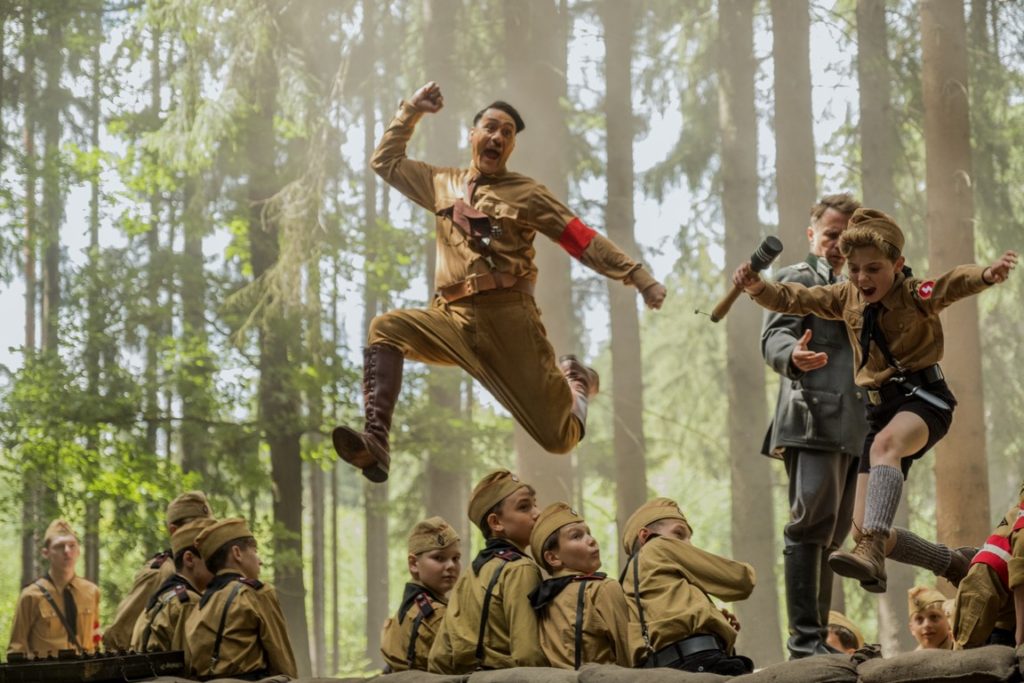DECEMBER 5, 2019
The first time I saw Taika Waititi’s “Jojo Rabbit,” I was a huge admirer of the chances it took with very risky material, but I wasn’t as taken with it as was some of my colleagues. My main problem was the transition from wacky comedy to heartfelt drama seemed to me more jarring than it needed to be. But two months later, I decided to revisit “Jojo,” and, as it turns out, my attitude changed considerably.
Waititi, the New Zealand filmmaker who shook up art houses with his 2016 “Hunt For the Wilderpeople,” as well as comic book fans with his 2017 “Thor: Ragnarok,” shakes up everybody with this film, based on the novel “Caging Skies” by Christine Leunuens. The story follows Johannes “Jojo” Betzler (Roman Griffin Davis), a 10 year-old boy living in a small town with his mother Rosie (Scarlett Johansson) in Nazi Germany during the last days of World War II.
Having run out of able-bodied men, the Nazis by this time were conscripting children, and Jojo is ordered to report to a Nazi training camp to learn to be a soldier. It doesn’t work out. Along with his best friend Yorki (the scene-stealing Archie Yates), a reluctant Jojo undergoes the training weekend, and it’s just as traumatizing as he had feared. Jojo’s trepidation comes to the attention of his Nazi leaders Captain Klenzendorf (Sam Rockwell), his assistant Finkel (Alfie Allen of “Game of Thrones”) and his tough-as-nails associate Fräulein Rahm (Rebel Wilson). Jojo is encouraged to display his steeliness by being ordered to wring the neck of a bunny rabbit. He can’t bring himself to do it, and to the demeaning cries of “Jojo Rabbit! Jojo Rabbit!”, he runs away in disgrace.
He is comforted by his mother Rosie (Scarlett Johansson), who seems to have some sway with Capt. Klenzendorf, who agrees to take on Jojo as an office helper. With his father away at the front, Jojo appears to need a male presence in the household, so he concocts an imaginary friend, a 10 year-old’s idea of Adolf Hitler (Waititi). Jojo’s Hitler is a bit of a goofball, trying to buck him up at every setback, but even Adolf is not enough to raise his spirits.
While prowling around his house, Jojo comes upon a young Jewish woman hiding in a cubbyhole in a bedroom. It turns out that young Elsa (Thomasin McKenzie) is being hidden in his house by his mother, but, upon meeting her, Jojo finds that she lacks the horns that he has been taught that Jews have. Moreover, he rather likes her, hoping to use her religion as a way of writing about Jews that will impress his Nazi overlords.
Waititi, as evidenced by “Wilderpeople” and “Ragnarok,” is a terrific filmmaker, and here he is given material with which he really connects that takes his filmmaking skills to another level. This is a wonderful film that might be off-putting to those who are sensitive to Nazi-themed material, but Waititi uses this for a reason. Like Charlie Chaplin and Mel Brooks before him, he uses the Nazi experience to make a powerful point, and despite the laughs that much of the film generates, Waititi’s concern is to make a pointed commentary against hate, a view that is much needed, especially today.
Just a word about the performances. Rockwell, who has earned two consecutive Oscar nominations — winning the Academy Award for “Three Billboards” — is an absolute hoot as the Nazi commendant (a phrase I never thought I’d write) and Rebel Wilson scores as his aide. Johansson delivers a lovely and loving performance as Rosie, displaying her determination to keep their family together in every frame, and McKenzie follows up her spectacular debut in last year’s “Leave No Trace” with her strong, confident work here.
But the entire film rests on the shoulders of young Davis, and he steps up to deliver one of the most assured child performances in recent memory. He expressively communicates Jojo’s fear, the same fear that many of us experienced in childhood, as well as his confidence, which many of us wish we have shown more of during those years. I hope that he continues acting, because he has proven here to have the stuff to be a terrific actor.
As such films as “The Great Dictator” and “The Producers” have proven, the mixture of Nazis and comedy is not always to every audience’s taste, but how Waititi uses that here to bring home his anti-hate message is potent. Love it or hate it, “Jojo Rabbit” is a provocative but much-needed addition to the 2019 movie scene.
GRADE: B+












